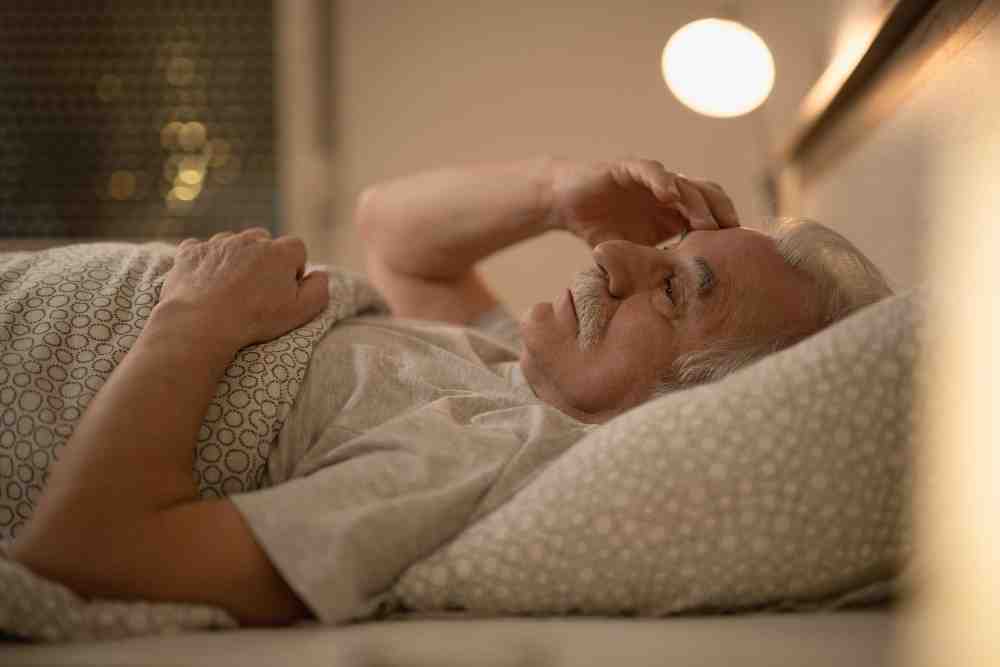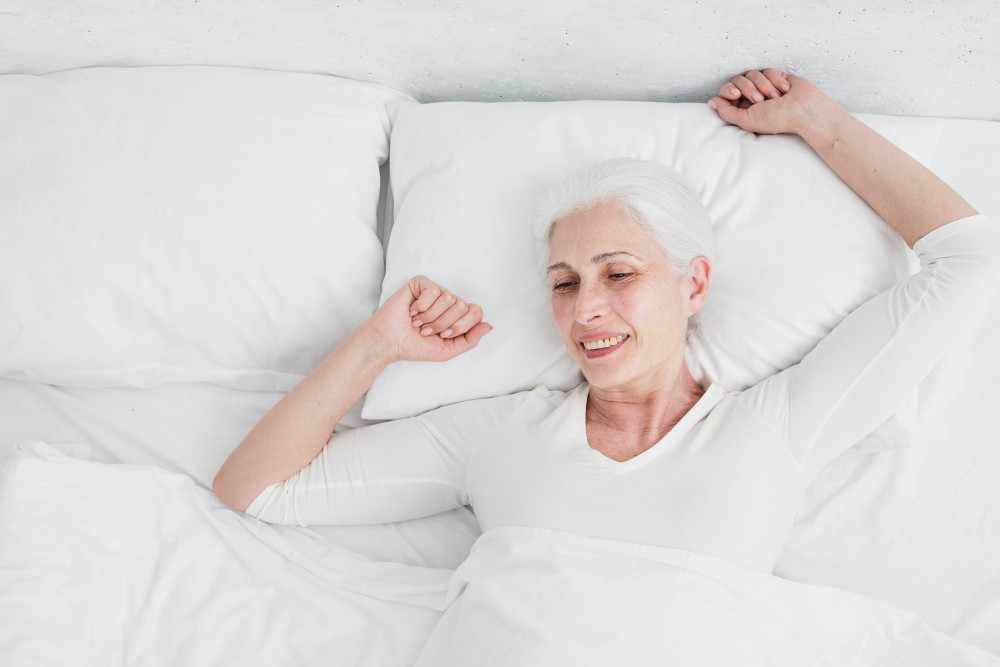How to sleep better at night naturally is a question on many seniors’ minds.
As we age, falling asleep and staying asleep often become more difficult. Instead of relying on medications with their potential side effects seniors are turning to natural, safe solutions that promote restful nights. In this guide, you’ll find science-backed tips designed especially for older adults.
Table of Contents
1. Align Your Internal Clock with Light Therapy
Exposure to bright or blue-enriched light during daytime hours has been shown to reset circadian rhythms in seniors. One study found that even 30 lux of blue LED light in the evening improved sleep efficiency in older individuals.
[light therapy source]

How to implement:
- Open curtains first thing in the morning.
- Use a daylight lamp (2,500–8,000 lux) for 30 minutes within one hour of waking.
- Dim lights and avoid screens 1–2 hours before bed.
2. Move Gently, Sleep Deeply: Exercise Tips
Regular physical activity like tai chi, light resistance training, and yoga has been demonstrated to improve sleep quality in older adults. A combination of these exercises not only supports sleep but also brain health.

[exercise studies]
Try this routine:
- 3 sessions per week.
- Includes 20–30 minutes of light weights or bodyweight exercises and 30 minutes of gentle walking or tai chi before late afternoon.
3. Practice CBT-I and Sleep Education
Cognitive Behavioral Therapy for Insomnia (CBT-I) is highly effective in older adults, comparable to medication in the short term and better long term. Incorporating sleep hygiene and relaxation techniques boosts results.
[CBT-I source]

How to begin:
- Start a sleep journal.
- Use stimulus control: get out of bed if unable to sleep.
- Keep bedtime and wake times consistent.
4. Calm the Mind with Herbal Allies
1. Chamomile
German chamomile extract in older adults improved sleep quality and reduced fatigue after four weeks.
[Chamomile study]
2. Lavender
Elderly participants drinking 2 grams of lavender herbal tea twice daily experienced better sleep quality within a month; higher doses produced greater effects.
[Lavender tea study]
Another trial showed lavender tea reduced anxiety and depression in seniors.
[Anxiety & sleep study]

3. Ashwagandha
In a 12-week trial, seniors (65–80) taking 600 mg/day Ashwagandha saw significant improvement in sleep quality, mental alertness, and overall well‑being, with no adverse effects.
[Ashwagandha RCT]
Disclaimer: Always consult your doctor before starting any new sleep routine, herbal remedy, or supplement—especially if you have existing health conditions.
5. Add Relaxation: Music, Aromatherapy & Breathing
- Low-tempo music before bedtime has been proven to improve sleep in older adults.
- Lavender aromatherapy via tea or inhalation enhanced sleep quality and alleviated anxiety/depression within four weeks.

Simple nightly ritual:
- 1 cup of chamomile or lavender tea.
- Gentle breathing exercises or guided imagery.
- Calm, slow music.
6. Follow Good Sleep Hygiene
Seniors should aim for:
- The bedroom temperature is around 18–20 °C.
- No caffeine, alcohol, or heavy meals within 2 hours of bed.
- No screens before bed—they emit blue light that hinders melatonin release.

7. Consider Magnesium & Melatonin Supplements
A study found magnesium, melatonin, and vitamin B effective for insomnia in seniors—particularly magnesium, which promotes relaxation and melatonin production.
[Supplement research]

Tip: Start with low-dose magnesium glycinate in consultation with a physician.
8. Professional Care: When to Reach Out
If sleep issues persist after 4 weeks:
- Seek CBT-I, available in-person or online.
- Discuss evaluation for sleep disorders or medication side effects.
- Melatonin may help—though benefits are modest (~15 minutes extra sleep)—and should be used under medical advice.

Disclaimer: Always consult your doctor before starting any new sleep routine, herbal remedy, or supplement—especially if you have existing health conditions.
9. Night Routine Cheat Sheet
| Time Before Bed | Recommended Activity |
| 2+ hours | Finish dinner; light exercise; no caffeine |
| 1 hour | Dim lights; enjoy herbal tea |
| 30 minutes | Deep breathing; relaxation music |
| Bedtime | Only be in bed when sleepy; start sleep journal if awake >20 min |
Conclusion
By integrating these approaches—light therapy, gentle exercise, CBT-I, herbal remedies, relaxation practices, healthy habits, and supplements—seniors can learn How to sleep better at night naturally. These methods are rooted in science, easy to follow, and free of prescription dependency.
📚 Additional Reading & Sources for How to sleep better at night
7 Proven Memory Exercises for Seniors That Actually Work
Chair Yoga for Brain Health: 5 Gentle Poses to Boost Memory & Focus
Kirtan Kriya Meditation: Boost Memory, Reduce Stress & Find Peace
Chair Yoga Workout for Seniors: Stay Active, Pain-Free & Energized
FAQs for How to sleep better at night
❓ How to sleep better at night without medication?
You can sleep better naturally by following a consistent bedtime routine, limiting caffeine, drinking herbal teas like chamomile or lavender, exercising during the day, and avoiding screens before bed.
❓ What is the best natural sleep aid for seniors?
Chamomile tea, lavender tea, and ashwagandha are among the best natural sleep aids for seniors. These helps calm the nervous system and improve sleep without causing side effects.
❓ Is it normal to sleep less as we get older?
Yes, it’s common for seniors to experience lighter sleep and wake up more often at night. However, consistently poor sleep can affect health and should be addressed naturally or with medical advice.
❓ Which bedtime habits improve sleep for older adults?
Calming music, a warm herbal tea, deep breathing, light reading, and avoiding TV or smartphones before bed can all help seniors sleep better at night naturally.
❓ When should a senior see a doctor about sleep problems?
If you’re still struggling with sleep after 3–4 weeks of natural remedies or if you feel tired during the day, it’s important to consult your physician. Sleep issues can sometimes point to underlying health problems
